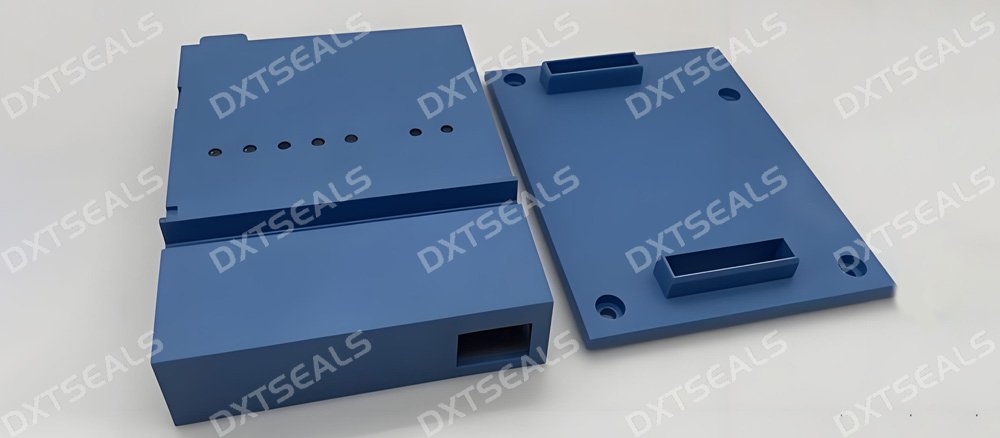Introduction
Electronic devices require durable, lightweight, and protective housings to ensure functionality, safety, and longevity. Choosing the right plastic material for electronic enclosures is crucial for achieving impact resistance, heat dissipation, electrical insulation, and aesthetic appeal.
At DXTSEALS, we specialize in providing custom plastic solutions for electronic product housings. In this guide, we will explore the key factors to consider when selecting plastic materials and compare the most commonly used types.
1. Key Factors to Consider When Selecting Plastic for Electronic Housings
To ensure optimal performance and durability, consider the following factors when choosing a plastic material for electronic product enclosures:
✔ Electrical Insulation
Plastic housings should offer excellent dielectric properties to prevent electrical leakage and ensure safe operation of electronic components.
✔ Heat Resistance & Thermal Management
Certain electronics generate heat, requiring plastics with good heat resistance to prevent warping, degradation, or melting.
✔ Impact Resistance & Durability
Electronics may face mechanical shocks, drops, or vibrations, so shock-absorbing and high-impact-resistant plastics are ideal for protecting delicate internal components.
✔ Chemical & Environmental Resistance
Depending on the application, enclosures may need to resist moisture, UV exposure, oils, and chemicals to maintain long-term performance.
✔ Weight & Aesthetic Requirements
Lightweight plastics improve portability, while materials that allow for custom colors, textures, and finishes enhance branding and product appeal.
✔ Cost & Manufacturing Feasibility
Material cost, moldability, ease of processing, and recyclability are essential considerations for large-scale production.
2. Best Plastic Materials for Electronic Housings
Here are some of the most commonly used plastic materials for electronic enclosures:
2.1 ABS (Acrylonitrile Butadiene Styrene)
✔ Excellent impact resistance & toughness
✔ Good electrical insulation properties
✔ Lightweight & easy to mold
✔ Affordable for mass production
📌 Common Applications: Computer cases, remote controls, power tool housings.
2.2 Polycarbonate (PC)
✔ Superior impact resistance (up to 250 times stronger than glass)
✔ High heat resistance & flame retardancy
✔ Transparent & UV-resistant options available
📌 Common Applications: Laptop enclosures, mobile phone cases, LED light covers.
2.3 Polypropylene (PP)
✔ Highly chemical & moisture-resistant
✔ Lightweight & cost-effective
✔ Good fatigue resistance for flexible applications
📌 Common Applications: Battery cases, electrical insulation components, cable coverings.
2.4 Polyethylene (PE)
✔ Flexible & impact-resistant
✔ Good moisture & chemical resistance
✔ Cost-effective for high-volume production
📌 Common Applications: Wire insulation, electronic packaging, protective casings.
2.5 Polyamide (Nylon)
✔ High mechanical strength & wear resistance
✔ Good thermal & chemical resistance
✔ Ideal for structural components
📌 Common Applications: Industrial electronics, high-performance circuit board housings.
2.6 Polyvinyl Chloride (PVC)
✔ Affordable & widely available
✔ Good electrical insulation properties
✔ Fire-resistant grades available
📌 Common Applications: Power adapters, cable conduits, electrical switch housings.
2.7 PBT (Polybutylene Terephthalate)
✔ Flame-resistant & heat-stable
✔ Good dimensional stability & chemical resistance
✔ Used for high-precision molding applications
📌 Common Applications: Automotive electronics, circuit board connectors.
3. Comparing Plastic Materials for Electronic Housings
| Plastic Type | Impact Resistance | Heat Resistance | Electrical Insulation | Chemical Resistance | Typical Applications |
|---|---|---|---|---|---|
| ABS | High | Medium | Good | Medium | Computer cases, remote controls |
| PC | Very High | High | Good | Medium | Phone cases, LED light covers |
| PP | Medium | Medium | Excellent | Very High | Battery cases, wire coverings |
| PE | High | Low | Medium | High | Protective casings, cable insulation |
| Nylon | Very High | High | Medium | High | Industrial electronics, gears |
| PVC | Medium | Medium | Excellent | Medium | Power adapters, switch housings |
| PBT | High | Very High | Excellent | High | Automotive electronics, connectors |
Choosing the right plastic depends on the specific application, durability requirements, and cost considerations.
4. Why Choose DXTSEALS for Custom Plastic Housings?
At DXTSEALS, we provide custom plastic solutions designed to meet the unique requirements of electronic product enclosures. Our advantages include:
✅ Custom Material Selection – Tailored plastic formulations for heat resistance, impact strength, and electrical insulation.
✅ Precision Manufacturing – Advanced molding, extrusion, and CNC machining techniques.
✅ Industry Compliance – High-quality materials meeting UL, RoHS, and ISO standards.
✅ Expert Engineering Support – Assistance in material selection, design optimization, and production feasibility.
✅ Reliable Supply Chain – Ensuring on-time delivery for bulk orders.
If you need custom plastic enclosures for electronic products, DXTSEALS is your trusted partner for high-performance and cost-effective solutions.
5. Conclusion
Selecting the right plastic material for electronic housings is crucial for ensuring durability, safety, and cost efficiency. By considering factors like impact resistance, heat tolerance, and electrical insulation, manufacturers can choose the best plastic for their specific applications.
At DXTSEALS, we specialize in custom plastic enclosures, helping businesses develop high-quality, durable electronic casings that meet industry standards. Contact us today for expert guidance on choosing the best plastic material for your electronic products!

